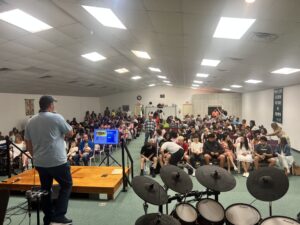
WASHINGTON (BP)–Congress has approved legislation that supporters believe will strengthen both the domestic and international efforts to combat human trafficking.
Passage by the House of Representatives and Senate on the same day brought an end to a lengthy, contentious debate over competing pieces of legislation. Activists in the anti-trafficking movement strongly favored a measure approved overwhelmingly by the House last December over one proposed in the Senate. In the end, a new bill more closely resembling the House version passed without objection in either chamber.
President Bush is expected to sign the William Wilberforce Trafficking Victims Protection Reauthorization Act, H.R. 7311, into law.
The legislation, supporters say, will:
— Significantly increase the ability of the State Department’s Trafficking in Persons Office to thwart sexual and other forms of trafficking overseas.
— Strengthen prosecution efforts against trafficking in the United States.
— Increase punishment for traffickers.
— Enhance protections for trafficking victims in this country.
— Empower U.S. attempts to halt the use of children as soldiers in other countries.
— Require the Justice Department to produce a model law for states to use in investigating and prosecuting trafficking.
— Clarify that federal law cannot be interpreted to consider prostitution as an acceptable mode of employment.
— Authorize a presidential award for exceptional efforts in the fight against trafficking.
A majority of those trafficked across international borders are victims of sexual slavery or exploitation, though trafficking also includes forced commercial and domestic labor, as well as coercive recruitment of children by military forces.
Congressional passage of the bill “is a tremendous victory for human rights,” said Richard Land, president of the Southern Baptist Ethics & Religious Liberty Commission. “The trafficking of women and children for sexual purposes and in sexual bondage is a terrible, terrible human tragedy. This is a great step forward in addressing this tragedy successfully. It took a tremendous amount of work by a broad coalition to bring this bill to fruition.”
The ERLC is a part of the diverse coalition that promoted the legislation.
Barrett Duke, the ERLC’s vice president for public policy and research, said he is “extremely pleased” with the measure.
“The bill assures that our country will continue to lead the world in stopping the horrific worldwide trade in humans,” Duke told Baptist Press. “The bill also has many very important provisions to help deal with our nation’s own problem with trafficking. The sex traffickers and pimps throughout our land will soon find it impossible to buy and sell children and women without finding our nation’s law enforcement arm pulling them off the streets and locking them away for a long time. Many thousands of children and women will be spared and rescued from a terrible fate because of this bill.”
About 800,000 men, women and children are trafficked across international borders each year, according to the Trafficking in Persons Office. This does not include millions of victims who are trafficked inside their own national borders, the office says. About 80 percent of the transnational victims are females, and as much as 50 percent are minors.
The trafficking office has estimated as many as 17,500 people are trafficked into the United States each year.
Approval by both chambers Dec. 10 without roll-call votes came about a year after the House voted 405-2 for a similar bill in December 2007. The Justice Department led opposition to the House-approved legislation while supporting a Senate version the ERLC and other anti-trafficking coalition members considered weaker.
Land and 13 other advocates for the House version warned President Bush in an August letter that his own Justice Department was threatening to tarnish his legacy in the battle against trafficking. Calling the Justice Department “out of step with your bold stance against slavery and human trafficking,” they urged Bush to bring the department into compliance with his policy goals and to provide unwavering support for the House-passed bill.
In the letter, Land and the other signers said the Senate bill did not include language in the House-approved version that is “necessary to aggressively prosecute sex traffickers” and further empower the State Department in its efforts against global trafficking. The Senate bill “hampers crucial enforcement provisions,” they told the president.
The Justice Department contended its opposition to the House measure was based on prosecutorial limitations placed on it by states’ rights and a lack of resources, the letter said. Land and the others contested those arguments, saying slavery has long been a federal issue and Justice “does not have to take up thousands of cases against pimp-traffickers, only the most egregious.”
The legislation is named after the evangelical Christian, William Wilberforce, who led the effort in Parliament year after year to outlaw the British slave trade, a campaign that finally succeeded early in the 19th century.
–30—
Tom Strode is Baptist Press Washington bureau chief.















